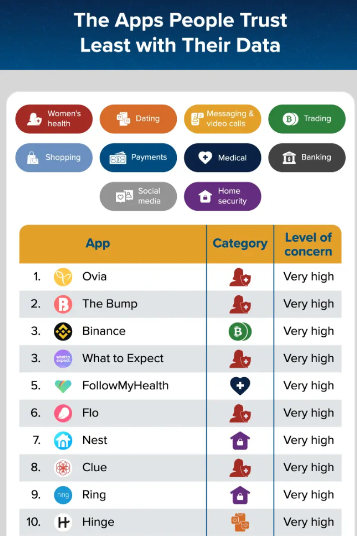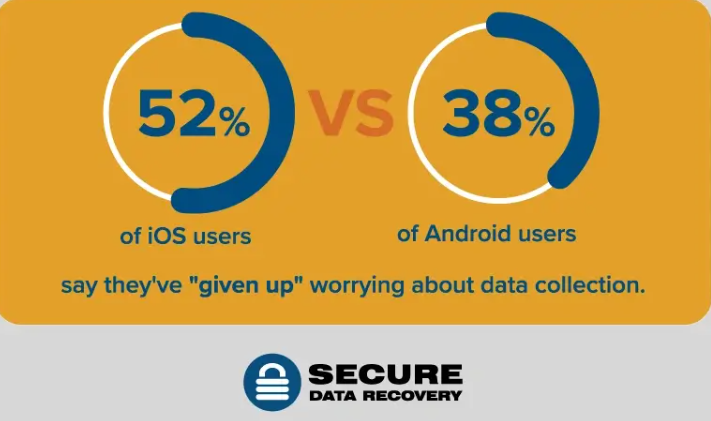
The state of privacy-compliant data collection is a hot topic in the ad tech industry. It is a debate that has even reached the halls of the federal government.
At the beginning of the year, President Biden declared a call to action during his State of the Union address to set “clear limits on how companies collect, use and share highly personal data.” It included your internet history, communications, location, health, genetic and biometric data.
On the other hand, ad industry groups, while supporters of federal privacy regulations, announced they would oppose rules that broadly restricted ad targeting. They asserted that privacy regulations should distinguish between harmful and responsible data collection practices.
What are the consumers’ views?
To find the answer, Secure Data Recovery conducted a study to find out which apps American consumers trust least with their data collection practices. They discovered that women’s health apps are the least trusted with data, and around 61% of people surveyed deleted an app because of data collection and privacy concerns.
Survey Says: “Ovia, You’re in Danger Girl”
Downloading an app to your phone and uploading your data is a process that only takes a couple of minutes and clicks.
Consumers often negate the concerns of sharing their data due to the ease of the process, but they should consider what data they are sharing and whom they are sharing it with. From something like an email address to your location, apps often use and distribute this data without consumer knowledge.
Although, data distribution is a normal part of the consumer and publisher value exchange. The key is developing trust with your consumer. A crucial factor that women’s health apps need help to gain. The distrust could be related to the social shift surrounding the Supreme Court Roe v. Wade decision.
Based on the data, more women reported having concerns with the data these apps collect than the number of people who use the apps. Ovia, a pregnancy and baby tracking app caused the most concern. It edged out banking, dating, and social media apps regarding distrust.
Next in line for concern was security apps. While the purpose of these apps is to make consumers feel more secure, they have the opposite effect. American consumers are more concerned about the data these security apps track. Security apps, Nest and Ring, ranked in the top 10 for most concerned.
Survey Says: Storage, Email and Social Apps are Most Trusted
The respondents said they are the least concerned about Dropbox’s data usage. The social media apps, Youtube and Reddit, and email apps, Outlook and Gmail, were right behind. The top 8 apps with the least concern were:
- Dropbox
- YouTube
- Outlook
- Firefox
- Target
- Gmail
- Google Maps
Secure Data Recovery acknowledged that the types of cell phones consumers use influence these stats. More Android users (58%) said they were conscious about their app’s data use, whereas IOS users (44%) were less concerned. In fact, over half of IOS users surveyed in the study said they stopped worrying about data collection.
The result is likely due to Apple’s ATT (App Tracking Transparency). The feature allows them to opt out of app tracking. This a smart move on Apple’s part as they give the consumer some power.
Survey Says: The Data Consumer Should Worry About
While Secure Data Recovery tracked consumers’ concerns, they added a warning that the concern about data usage and the actual data that some apps collect don’t align. The data comes from watching videos, replying to emails, or navigating around certain websites. As shown in the image above, YouTube, Target, Gmail, and Google Maps track more data than consumers know.
On the other hand, Women’s health apps should veer on the lower edge of concern for data collection based on Secure Data Recovery’s research. Tracking a pregnancy, period, or storing health records makes users more cautious.
Survey Says: Money Could Change Sentiments
Based on the surveys, three out of five Americans have deleted an app based on privacy and data compliance concerns. Yet, many consumers say they are open to sharing their data if compensated accordingly. Over half, about 66% of respondents, said they would be more open to data collection if companies paid for it.
Companies like Caden, BigToken, and Reklaim have noted this advice. While it is a fledgling market, they help consumers get paid for their data. More brands should follow suit.
Read the full study here.


